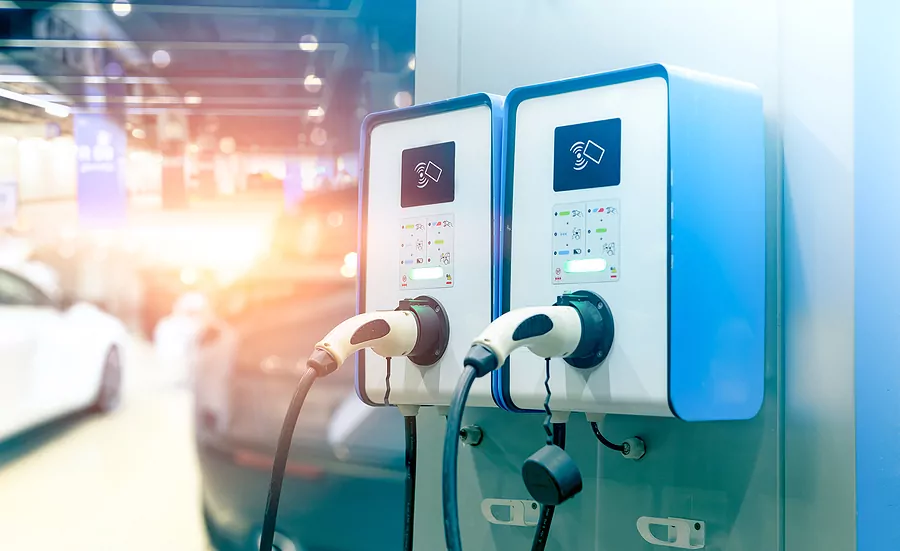
We've all heard about the everyday commuter who charges up in their garage every night—but what about the commercial or industrial business that's trying to operate efficiently but is working at a much larger scale? Installation and management is different for commercial EV charging stations and industrial EV fleets.
From start to finish, here's what to know about EV charging stations on site (for workers and customers alike).
How Much Energy Does Transportation Contribute?
To understand the importance of EV chargers for commercial and industrial businesses, take a look at how much energy transportation really contributes.
In reality, transportation contributes 30% of all energy consumption—which means catering to plug-in hybrid (PHEV), hybrid, and all-electric (EV) vehicles helps to reduce the load. You can do this by having your own EV fleet or supplying EV car chargers to your customers.
Plus, using EV fleets helps keep America's levels of imported petroleum down (2020 was the first year since at least 1950 that total annual petroleum imports were less than exports). This bolsters the US economy at a time when global supply chains are fickle and gas prices are rapidly rising.
An EV Charger Network Could Help You Comply Amid Changing Regulation
The current U.S. administration is proposing regulation that caters to sustainability, which means employing the use of EVs.In addition to increasing the number of electric buses throughout the country, the infrastructure plan proposes $7.5 billion in spending to expand the country's EV charging station network.
As a business leader, it's important to stay ahead of the curve in regards to the changing state of sustainability regulation.
Think About Your Charging Infrastructure Early
Take a look at resources like PlugShare and the U.S. Department of Energy's Alternative Fueling Station Locator to see how saturated (or unsaturated) the EV charging web is near you.
You don't have to wait until the region is teeming with chargers. Instead, get your EV charging infrastructure in early. This ensures you'll be an integral part of the network as it comes to life. Plus, you'll firm up your energy resilience ahead of time.
How Much Power You Need for Commercial and Industrial EV Chargers
Businesses typically use a networked charger. This type of EV charger is best in commercial or workplace settings, whether or not they require payment.
Like the Level 2 chargers found in residential settings, Networked Level 2 chargers typically provide 16–40 amps of power output, which can deliver between 14–35 miles of electric range per hour of charging. Networked chargers also provide features like:
- Remote access and control via Wi-Fi or smartphone connection
- Access control and ability to accept multiple forms of payment
- Load balancing across multiple chargers (that's good for your energy usage!)
If your business needs to operate more quickly, you can opt for DC fast chargers, which offer the highest power. Typically, DC fast chargers provide 480+ volts and 100+ amps (50–60 kW) of power and can produce 178 miles of electric drive per hour of charging.
Thanks to EV innovation, companies are currently developing newer and faster DC fast chargers that can produce 150–350 kW of power. This makes EV power even easier for the average business.
Get State and Federal Incentives for Your EV Fleets and Chargers
Commercial and industrial businesses with EV fleets also receive incentives. Check these incentives out:
- In Pennsylvania, Driving PA Forward offers a primary electric car rebate program for EV charging equipment. The program provides grants for the purchase, installation, maintenance, and operation of EV charging stations. According to EVConnect, "The total grant value per charger is between $3,500 and $4,500, or 50% to 90% of the total project cost—whichever is lower."
- Residents in any state get a federal tax credit that gives their business "30% of the total cost of purchasing and installing a ChargePoint electric vehicle charging station."
- There's also a Notice of Funding Opportunity (NOFO) out for transit buses and their associated acquisition, construction, and leasing of required supporting facilities.
- The PECO Commercial Level 2 Electric Vehicle (EV) Charger Rebate offers up to $1,500 per charger installation.
Industrial and Commercial EV Charging Stations Are the Future
EV charging startups are everywhere supplying cloud-based networks of EV charging stations and portable backups. Blink Charging, ChargePoint, and SparkCharge are just a few of the companies that have already made an imprint in the charging network.
ChargePoint offers retail solutions to help commercial businesses attract more customers, secure additional revenue, and set themselves apart in the sustainability space. If you're looking for chargers for an industrial EV fleet, there's also BTCPower and EVgo.
BTCPower has a full line of DC Fast Chargers to service urban, commercial, workplace, and highway locations. Their chargers work with passenger EVs as well as heavy-duty EVs like school buses, shuttle buses, and transit buses.
Meanwhile, EVgo offers business, commercial, and fleet solutions. This includes the fleet depot and the public network alike.
Above All Else, Why Install EV Chargers At Your Workplace?
With all of these options, it's important to remind yourself why you're making an EV charger investment in the first place. Maintaining relevance, building loyalty with a new audience, operating more sustainably, and marketing yourself in a new way—those are just a few of the perks of installing industrial and commercial EV charging stations near you.
Not sure where your employees stand on the EV issue? Consider offering a survey—and a small incentive for completing it. As it turns out, workers are 20 times more likely to buy an EV if their employer offers free charging at work.
To get a move on those EV charging stations, consider partnering with an energy consultant. They'll help you choose the right type of charging stations for your needs and, if necessary, adjust your energy load profile to ensure a seamless transition (and an unsurprising energy bill).
For a more holistic approach to energy efficiency, you can even learn about what it takes to implement renewable energy, smart lighting, and more, all for a manageable cost.
